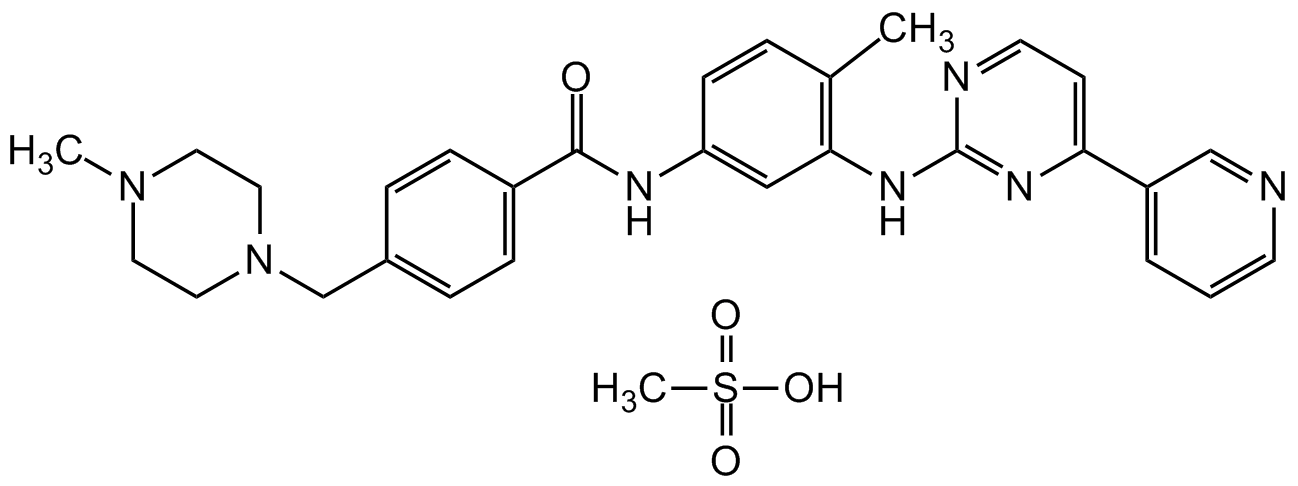
Chemical Structure
Imatinib . mesylate [220127-57-1]
AG-CR1-3725
CAS Number220127-57-1
Product group Chemicals
Estimated Purity>98%
Molecular Weight493.6 . 96.1
Overview
- SupplierAdipoGen Life Sciences
- Product NameImatinib . mesylate [220127-57-1]
- Delivery Days Customer10
- CAS Number220127-57-1
- CertificationResearch Use Only
- Estimated Purity>98%
- Hazard InformationWarning
- Molecular FormulaC29H31N7O . CH4SO3
- Molecular Weight493.6 . 96.1
- Scientific DescriptionChemical. CAS: 220127-57-1. Formula: C29H31N7O . CH4SO3. MW: 493.6 . 96.1. Imatinib mesylate is a multitarget tyrosine kinase inhibitor with antineoplastic activity. It is a potent and selective inhibitor of the kinases Bcr-Abl (IC50 = 38 nM), PDGFR and c-Kit, which are encoded by the bcr-abl oncogene, as well as receptor tyrosine kinases encoded by c-kit and platelet-derived growth factor receptor (PDGFR) oncogenes, which is useful in vitro and in vivo. Imatinib inhibits ligand-stimulated autophosphorylation of PDGFR and c-Kit and the proliferation of Bcr-Abl-dependent R10(-) cells and HMC-1 cells expressing constitutively active c-Kit in a concentration-dependent manner. Formulations containing imatinib have been used in the treatment of various cancers. Specifically, it is used for chronic myelogenous leukemia (CML) and acute lymphocytic leukemia (ALL) that are Philadelphia chromosome-positive (Ph+), certain types of gastrointestinal stromal tumors (GIST), hypereosinophilic syndrome (HES), chronic eosinophilic leukemia (CEL), systemic mastocytosis and myelodysplastic syndrome. Abelson (Abl) kinase inhibitors have been shown to inhibit replication of Ebola virus, coxsackievirus and vaccinia virus, but at different points of the virus life cycle. Imatinib inhibits replication of SARS-CoV and MERS-CoV in vitro by a novel mechanism of blocking coronavirus virion fusion with the endosomal membrane. Abl is also a potential drug target of SARS-CoV-2 and can possible inhibit the spread of COVID-19. - Imatinib mesylate is a multitarget tyrosine kinase inhibitor with antineoplastic activity. It is a potent and selective inhibitor of the kinases Bcr-Abl (IC50 = 38 nM), PDGFR and c-Kit, which are encoded by the bcr-abl oncogene as well as receptor tyrosine kinases encoded by c-Kit and platelet-derived growth factor receptor (PDGFR) oncogenes, which is useful in vitro and in vivo. Imatinib inhibits ligand-stimulated autophosphorylation of PDGFR and c-Kit and the proliferation of Bcr-Abl-dependent R10 cells and HMC-1 cells expressing constitutively active c-Kit in a concentration-dependent manner. Formulations containing imatinib have been used in the treatment of various cancers. Specifically, it is used for chronic myelogenous leukemia (CML) and acute lymphocytic leukemia (ALL) that are Philadelphia chromosome-positive (Ph+), certain types of gastrointestinal stromal tumors (GIST), hypereosinophilic syndrome (HES), chronic eosinophilic leukemia (CEL), systemic mastocytosis and myelodysplastic syndrome. Abelson (Abl) kinase inhibitors have been shown to inhibit replication of Ebola virus, coxsackievirus and vaccinia virus, but at different points of the virus life cycle. Imatinib inhibits replication of SARS-CoV and MERS-CoV in vitro by a novel mechanism of blocking coronavirus virion fusion with the endosomal membrane. Abl is also a potential drug target of SARS-CoV-2 and can possible inhibit the spread of COVID-19.
- SMILESCS(O)(=O)=O.CN1CCN(CC2=CC=C(C=C2)C(=O)NC2=CC=C(C)C(NC3=NC=CC(=N3)C3=CN=CC=C3)=C2)CC1
- Storage Instruction-20°C,2°C to 8°C
- UNSPSC12161509


![Imatinib Mesylate [220127-57-1]](https://www.targetmol.com/group3/M00/03/52/CgoaEWY7R_mEOP5EAAAAAEMUeMc415.png)